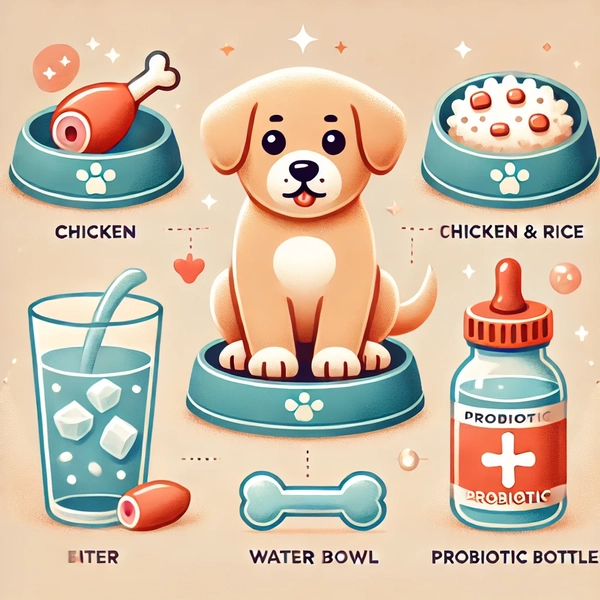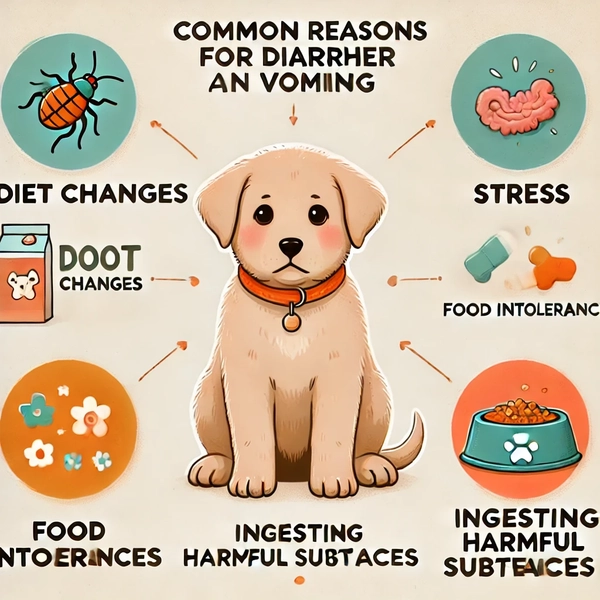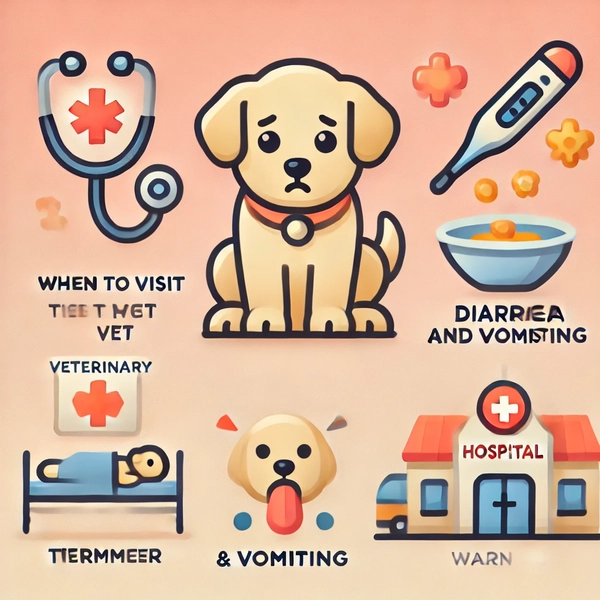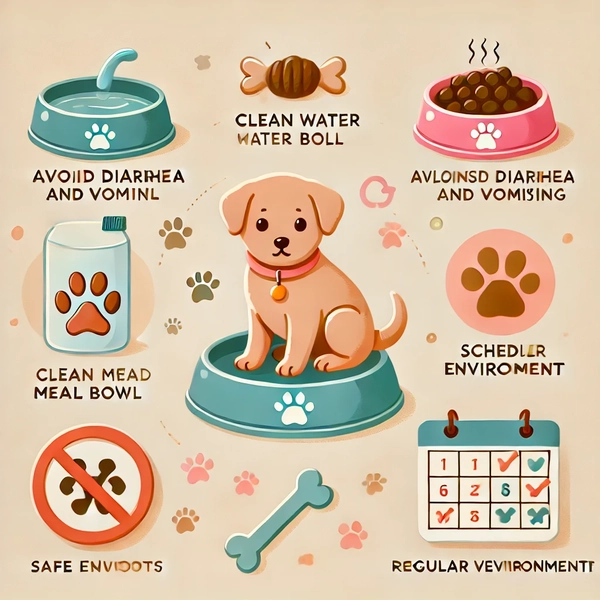What to do when your puppy has diarrhea and vomiting? It may be overwhelming for pet owners when their little fur-baby starts having a lot of watery stool and regurgitating its food.
This is primarily because normally active puppies are rarely sick, which creates a lot of ‘what next’ in them.
We sympathize with your situation and understand the frustrations of seeking solutions to such problems. That is why we have come to help you.
What to Do When Your Puppy Has Diarrhea and Vomiting

Here is a step-by-step guide to what you should do:
Assess the Situation
Check on your puppies’ developmental stages and symptoms: Are they active? Is he throwing up frequently? Observing these factors helps gauge the level of the problem and decide if a trip to the animal hospital is necessary.
Encourage Patients to Drink Water
Always keep your puppy hydrated. Be sure that your puppy always has fresh, clean water available. Some puppies become dehydrated very fast due to excessive vomiting and diarrhea, so encourage them to drink. If your puppy does not want to drink water, you can entice him with unsalted chicken broth floating in the water.
Offering Ice Cubes can also be a fun way to help them remain hydrated. Drinking out of their bowls may be less interesting than licking or chewing on ice cubes.
Withhold Food Temporarily
Refrain from feeding them for about 12 hours to allow their digestive systems some rest. However, do not withhold water. This short food deprivation can be beneficial to the healing process.
Reintroduce Food Gradually
Reintroduce food following the fasting period. Start with a bland diet of boiled chicken (skin and bone removed) mixed with plain white rice. Provide tiny portions every few hours and monitor their reaction.
If you prefer, you may also offer a veterinary prescription for a gastrointestinal diet. That is a unique dry food for pets on a sensitive-stomached diet. Thus, bland diets are soothing and less demanding to the tummy’s digestive system.
Watch Out Warning Signs
Pay attention to their health state. Be vigilant for blood in feces or vomit, any symptoms of dehydration (like dry gums or a general lack of energy), and any signs of abdominal discomfort (such as crying out when touched). Call the veterinarian as soon as you detect any of such indicators.
Maintaining Their Comfort
Once you take the pup home in its new happy abode, ensure its surroundings are warm, soothing, and comfortable. When ill puppies show signs of sickness, it is very advisable to restrict their movements. Thus, a place away from noise will be beneficial in allowing them peace of sleep.
Discourage activities culminating in physical exhaustion, such as going for long walks and engaging in play activities. While recollecting, do not allow repeated actions. Instead, they should lie down for most of the time.
Restricted Feeding
When your puppy feels better, you can feed them more at even intervals. This is good for regulating their digestive system without the system getting used to large intakes at once. At a point, they can expand the sizes of the meals appropriately.
Use of Probiotics
You could also give some safe puppy probiotics for dogs to help the good bacteria in their tummy come back to normal. This will help speed up the recovery process and improve digestion.
Do Not Offer Unnecessary Foods
Do not feed your puppy any other food that might make its tummy more upset than it is, such as dairy, fries, or spicy snacks. Focus more on soft, appetite-encouraging dishes until their condition improves from gastroenteritis.
Call Your Vet if Symptoms Persist
If the vomiting and diarrhea do not stop after 24 hours or if they get any worse, contact your vet. Persistent symptoms tend to signal underlying severe conditions that may require medical attention.
Such measures are helpful if taken early enough, and the puppy will recover quickly. Remember that sometimes, those ulcers and vomiting come in that people consider normal.
But it is because if these issues are not managed well, they become severe. It is ignorable to health practitioners who advise that a veterinarian should be consulted whenever one doubts their health or their animal’s health.
For further details, check The Kennel Club’s trusted source on puppy diarrhea and its associated care. This resource further elaborates on some causes, cures, and when to rush with a puppy to a vet.
How to Treat Diarrhea in Puppies at Home

If you won’t be seeing the veterinarian, be sure your puppy has continuous access to fresh water to stay hydrated.
Suppose your puppy does not want to drink water. In that case, you can attempt to drizzle a little of the contents of a tuna can into their water or ice cubes (don’t use the C tube that contains tuna in brine because that contains more salt that may have a dehydrating effect) or you can just give them ice to lick.
If the dog drinks, you can introduce bland diets for several days. This may include boiled chicken breast and soft white rice.
At the same time, you can provide chicken and rice for them. However, commercially prepared gastrointestinal diets (for example, Purina PRO PLAN® Veterinary Diets EN Gastrointestinal) are superior since there is a recommended feeding guide to ensure you do not fall short of your puppy’s energy requirements.
These diets also contain particular components meant to help your puppy’s stomach as much as possible.
There are also Probiotics for Dogs, such as PRO PLAN® Fortiflora. If not, drink, projectile vomits, or further abdominal upsets develop, have your pet examined by a veterinarian.
Common Reasons for Diarrhea and Vomiting

Let us turn our focus to some of them below:
Diet Changes:
Puppies’ stomachs are delicate. Any drastic change in their diet can cause an upset stomach. If you have recently changed your diet, try to recall whether that was done gradually—if not, that might cause the disturbance.
It is best to make any alterations gradually over a week or two. Abrupt modifications may upset their digestive system, leading to loose motion or vomiting.
Stress:
Puppies are susceptible to stress whenever they change their locality, interact with strangers, or even follow a different schedule, which can result in stomach problems.
Most puppies suffer from stress when they move to a new home, but this usually goes away as the puppy becomes used to residence. You must help them cope by giving them time and comforting them.
Parasites:
Worms and parasites are something they will have to contend with as a puppy. Like most young animals, they are prone to picking up these organisms quickly, even from their mother.
Roundworms, hookworms, and Giardia are a few of the parasites that can wreak havoc on a puppy’s sensitive belly.
You might find your new puppy with an ill-looking posture, a bloated tummy, or worms in punctured stool bags.
This is why deworming your puppy, according to the veterinarian’s guidance, is essential for keeping it healthy.
Eating Something They Shouldn’t Puppy:
Puppies have a natural inclination to discover and understand their environment. Therefore, they are likely to put things into their mouths and, worse still, swallow inedible objects like rubbish, house plants, and little toys.
Eating these substances can cause vomiting or diarrhea. You must supervise your puppy and make your home safe for the pet by putting away any hazardous items.
Items such as plastic that can be chewed or swallowed, small objects, and ornamental shrubs should be considered.
Food Intolerances:
Puppies can also have food sensitivities. Some dairy, proteins, and dog treats may cause an upset stomach. If you think your puppy has some kind of food intolerance, it’s best to speak to your vet to modify their diet accordingly.
When to Visit the Vet

Diarrhea and vomiting may sometimes point towards a more severe issue. These are reasons why you should certainly take your puppy to the vet:
- Severe or Prolonged Symptoms: E.g., If the Diarrhea or vomiting is copious or persists for more than a day. Babies can become dehydrated as a result of prolonged vomiting and diarrhea, which can prove detrimental.
- Vomit or Stool Contains Blood: If your pet starts throwing up blood or passing bloody diarrhea – it is most likely due to an infection, some gastrointestinal inflammation, or even trauma. If it’s just a little bit, it’s still better to consult your veterinarian.
- Not Able to Eat or Drink: Puppies that have not eaten or drank for some time may warrant special attention. Not eating may also mean some pain or discomfort that needs medical help.
- Additional Signs: If they appear weak, have pale or bluish gums, or are trying to defecate unsuccessfully, it is a cause for concern. You should seek medical help. The presence of benign-looking gums may suggest either anemia or a state of thirst, and both conditions call for quick intervention.
- Stomach Discomfort: A distended abdomen for pups or a painful touch on their bellies could be warning signs of bloat or blockage of the intestines.
Advice for Avoiding Diarrhea and Vomiting

These intestinal problems are more accessible to prevent than treat. To help keep your dog healthy, here are a few suggestions you may consider.
- Change Nutrition Gradually: If you want to change your dog’s food, it is best to do it gradually. For the second part of the week or ten days – eliminate a small portion of the old one and substitute it for the new one. A puppy’s stomach is sensitive; therefore, such measures are necessary.
- Do Not Feed Dogs Leftovers: Most human food is dangerous for dogs. Chocolates, grapes, onions, fatty foods, and many more are highly risky and could put dogs in alarming conditions. Do not give in to the puppy eyes that beg you when food is served, and you are having dinner!
- Make Sure Everything Is Out Of The Dogs’ Reach: Cleaning items such as sprays, disinfectants, and other materials, as well as plants, medications, and even tiny stuff, are all out of the dog’s reach. Puppies are fond of chewing, but most things around them are unsafe. Some household items can be poisonous, and some ingestion can result in choking hazards.
- Vet Visit regularly: Always follow up so the clement is up to standard in all vaccinations and worming. A veterinarian may also advise specific diets for sensitive tummies. Consistent monitoring helps prevent severe conditions from arising.
- Puppies Need To Be Given A Fixed Schedule: To improve their growth and development, puppies should be given a timeline or routine. Timetables involving feeding, play, and sleep can help relieve tension and thus aid in digestive system problems. Regular schedules can also provide the puppy with stability and contentment.
Understanding Vomiting vs. Regurgitation
Regurgitation and vomiting may seem similar at times. Vomiting requires more effort and may even come with discomfort as it releases content from the stomach or the small upper intestinal tract.
Regurgitation is more of a speedy task, as it only occurs by pouring out undigested food or liquid taken in shortly after losing it without much effort.
Knowing which two happened is crucial in helping your veterinary physician provide an accurate diagnosis and appropriate treatment strategies.
Staying Hydrated Helps a Lot
In advanced countries, many families keep puppies as pets, but dehydration is still common in young puppies. If your puppy refuses to drink any fluids, you can try some of the following methods to promote intake of fluids:
- Addition of Unsalted Chicken Broth: An unsalted chicken broth may be added to the puppy’s drinking water. It is pretty palatable and aids in the puppy’s drinking behavior, particularly when it has become too lazy to drink plain water.
- Electrolytes are safe for puppies: Safe electrolyte solutions for canines may be beneficial. These are practical, mainly when your puppy retains excessive fluid and loses a lot of fluids.
- Highly Moistured Foods: Providing highly moist foods like adding water to mash and feeding puppies versus wet canned food helps the puppy stay hydrated.
Food and activity modifications during gastritis in puppies
Instead, there are some particular foods you should be attentive to your dog in the following situation:
| Food Type | Why It Helps |
| Boiled Chicken & Rice | Gentle on stomach, easy to digest |
| Canned Pumpkin (plain) | Adds fiber, helps firm up stool |
| Gastrointestinal Dog Food | Specially formulated to soothe the digestive tract |
| Scrambled Eggs (plain) | Easy to digest protein, gentle on stomach |
Refrain from providing any food with oil, spices, or milk, which will intensify the problem. Foods high in fat tend to make diarrhea more serious, while dairy products may further aggravate the condition if the puppy is lactose intolerant.
Finding Parasites and their Symptoms
Because of their immaturity, puppies tend to be infected with parasites such as roundworms, hookworms, or giardia. Such organisms are the leading cause of gastrointestinal problems, such as diarrhea and vomiting.
Look for ‘wormies’ in your puppy’s poop; they may appear as thin tiny strings or small white grains like rice. If you see anything in your dog’s feces that looks like this, seek your vet’s help immediately.
Generally, routine parasite control is recommended by deworming and fecal examination in trials in puppies’ first year of life.
Poisoning Symptoms in Pets – Vomiting and Diarrhea
Puppies are curious and adventurous; sometimes, they get to inappropriate stuff. There are poisonous things around the house. Here is a list of some of the common household threats:
- Chocolate: Theobromine. Poisonous to your canine companion.
- Onions and Garlic: Toxic to dogs and negatively impact their red blood cells.
- Grapes and Raisins: The sudden kidney failure of dogs.
- Cleaning Supplies: Pets can suffer the effects of even insignificant volumes.
- People Drugs: This includes some over-the-counter drugs like cough medicine. Medications can kill a puppy.
If you suspect your puppy has ingested a poisonous substance, contact your veterinarian or the closest animal poison control center immediately.
Why Do Puppies Vomit In The First Place?
Vomiting and diarrhea are two different things with many possible causes. Vomiting can also occur due to car sickness if the puppy has been in a vehicle for some time, if the puppy eats too fast, or due to a foreign body that the puppy has swallowed, for example, a toy or a sock.
Puppies love to chew on various objects, and they may even manage to swallow some of them, causing an obstruction and subsequent vomiting.
If the vomiting persists, taking your puppy to a vet becomes imperative to check for an obstruction, which, if left untreated, may pose a danger to the puppy’s life.
Natural Remedies For Safer Vomiting Cases
If your puppy has not been diagnosed with severe vomiting or diarrhea, you may seek some treatment alternatives from home:
- Probiotics: Such inclusions might be beneficial, as dog probiotics break down their intestinal flora’s overall percentage. Over-the-counter products usually assist in the growth of good bacteria and the settling of disturbed stomachs. These, however, are for dogs.
- Short-Term NPO: The patient is not allowed food for 12 hours (water is not included!), especially in the case of excessive vomiting. This is to help settle down the system.
- Bland Diet Reintroduction: This advance is introduced after a short fasting period. Then, we introduce food, first boiled chicken and rice. Provide tiny portions every few hours and watch their reaction before adding more food.
Always check with your vet before attempting home remedies on puppies, as they are very susceptible to illnesses, especially very young ones.
How to Know When It is Getting Worse
At times, you may get the false impression that the dog is getting better, only for the deterioration of symptoms to kick in once more. Watch out for:
- Excessive Vomiting or Diarrhea: If it occurs every few hours with such frequency that it becomes impossible to go on without medication. Those are s/s that indicate that non-pharmaceutical treatment has failed.
- Weariness or Lethargy: Young pups are usually active. Weakness, tiredness, or lack of energy should raise alarms. A puppy lying around, not participating in its scheduled playtime, or sleeping too much may cause concern.
- Tummy Hurts: If the dog howls in pain as your hand grazes its abdomen or the abdomen appears disfigured, head to the vet soon. Pain in this area may be due to a mild temporal abdominal wall pain or something serious, like an outflow obstruction or pancreatitis complication.
- Uncontrolled drooling or licking of lips: Profuse drooling or licking of the lips is also sometimes associated with wanting to vomit. Take note of this and observe them more.
| Symptom | Possible Cause |
| Blood in Stool | Inflammation, infection, or parasites |
| Vomiting + Lethargy | Potential poisoning or severe dehydration |
| Worms in Stool | Parasite infestation |
| Pale Gums | Dehydration or anemia |
| Swollen Belly | Bloat, gas buildup, or intestinal blockage |
| Frequent Lip Licking | Nausea |
In conclusion, what should you do when your puppy has diarrhea and vomiting? You know your puppy’s health the best. Respond to your vet if you are a potential tryout or prefer not to.
Some degrees of vomiting or diarrhea may self-resolve; however, the individual must be aware that when flooding in a Wellington out of the entire boots is imminent, preventive measures should be sought in a veterinarian’s office.
The trick to drawing the line between the two and enabling your puppy to cope with vomiting and diarrhea is to avoid panicking—don’t do it—keep the puppy well hydrated, and know the right moment to seek assistance.
All puppies respond well to treatment, and it is only a matter of time before things return to normal. All you have to do is make the puppy as comfortable as possible, observe its condition, and provide plenty of affection. They’ll be back up and about in no time.